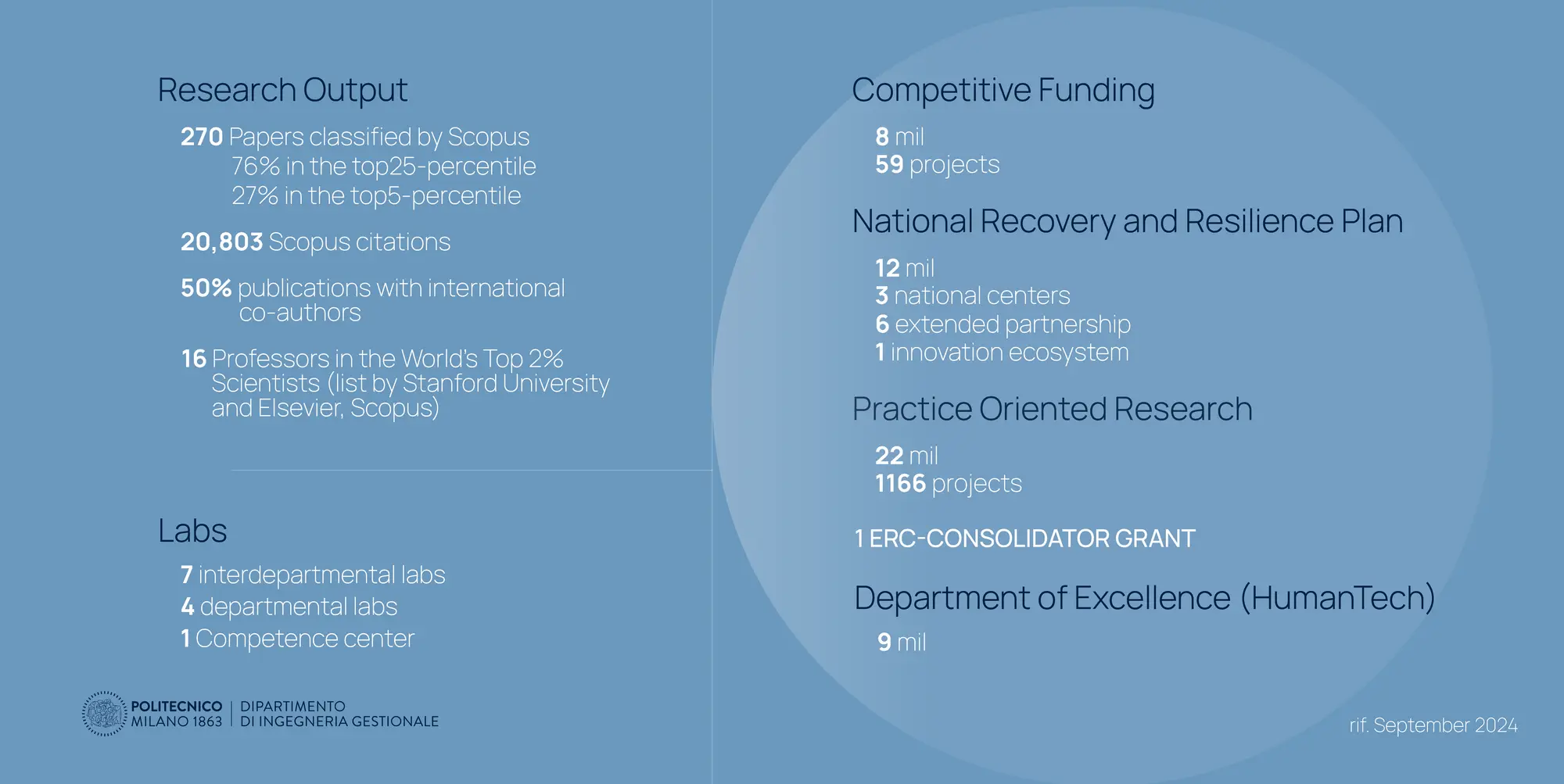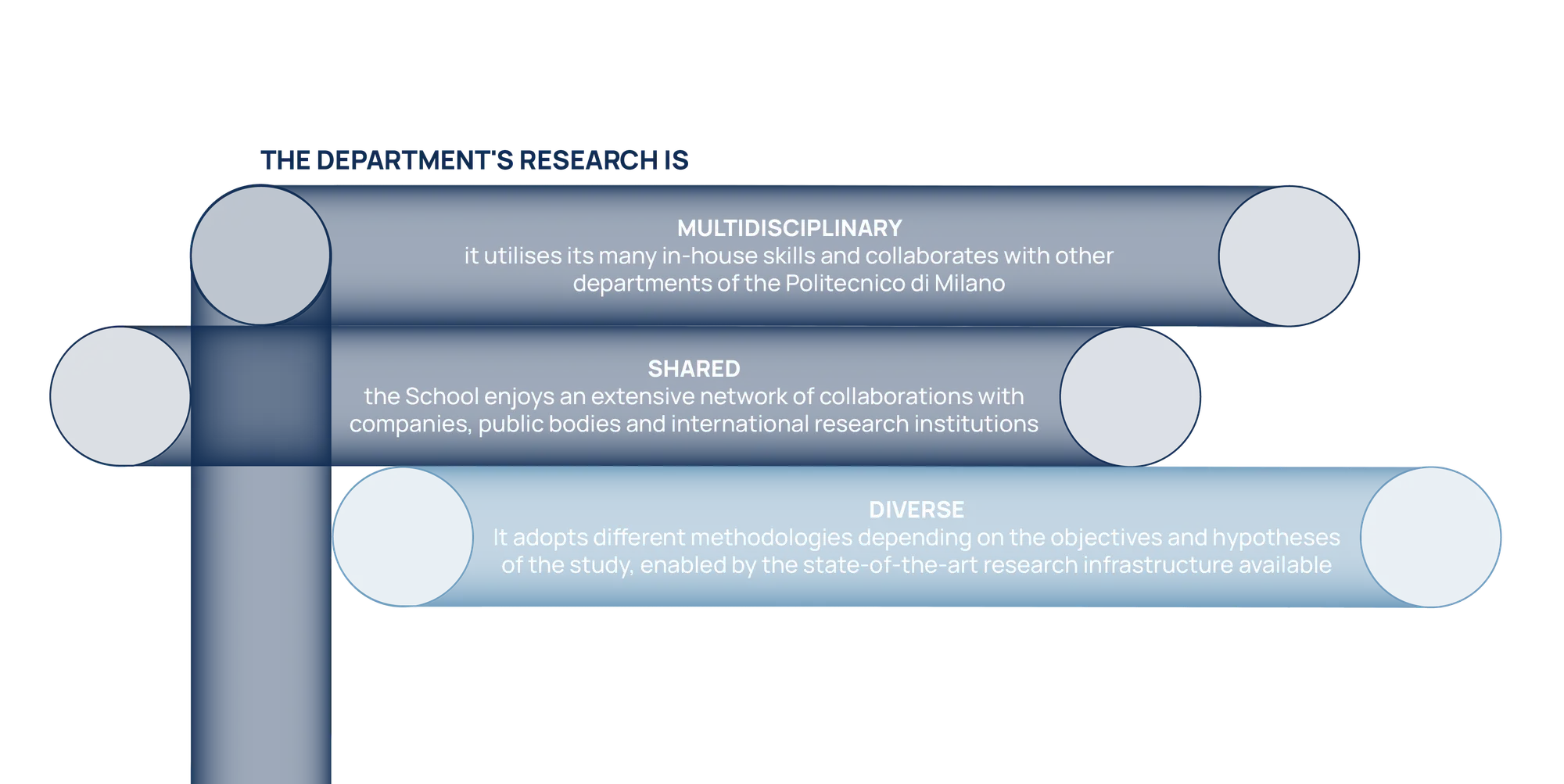Overview
Overview
The Department's ambition is to always push beyond the boundaries of knowledge that integrates industrial engineering, management and applied economics. Participating in the growth of this knowledge means contributing to the sustainable development of society and economic and industrial systems.
Key Facts

Methods
The Department develops research with a focus on scientific rigour and quality of method, with the aim of producing results that are relevant to its stakeholders, and a positive impact on society. Every decision is made with particular attention to the ethical principles of research, in line with its own code of ethics and that of the University.

Areas
The three disciplinary areas contribute to the Department's research.
- Management: deals with management and innovation within companies, financial institutions, the public administration and non-profit organisations, studying them from a strategic and organisational perspective and focusing on the interaction between strategy, management and the use of technology.
- Applied economics: studies theories and models of economics applied to issues in the industrial, international and financial fields, plus innovation and entrepreneurship. Individuals, companies, non-profit organisations, the public administration, industries and states can all be examined.
- Industrial engineering: implements strategies, methodologies and techniques used in the planning, design, modelling, construction and operation of industrial plants, production systems and infrastructure that manage goods and services, and for the maintenance, transformation and disposal of such systems.
The disciplinary areas collaborate with the knowledge centres of the School of Management which promote research, projects and observatories in specific areas of Management, Applied Economics and Industrial Engineering.
Types of Projects
The Department undertakes different types of projects: Funded projects, granted by public or private institutions, national or international, based on competitive calls, research platforms, which are stable research projects in collaboration with groups of public and private entities in specific fields of knowledge, research and studies commissioned by public and private organisations.
UE Funded Projects
Horizon Europe Programme
The Department is actively involved in various European Commission funding programmes, in particular the Framework Programmes for Research and Innovation, through which the EU implements its science and innovation policy.
In six years of activity (2014–2020), the Horizon 2020 programme has allocated around €15 million in funding to the department.
At the end of 2023, the funding received from the Horizon Europe programme, active since 2021, amounted to €8 million.
NRRP National Recovery and Resilience Plan
The National Recovery and Resilience Plan (NRRP) is Italy's response to the call launched by the European Commission to counter the recession and capitalise on the drive for innovation of recent years. The action that concerns the Politecnico di Milano community most closely is “Mission 4 Component 2”, which aims to foster the transfer of scientific and technological results from research to industry.
The Department is involved in the following projects:
National Centres
- Sustainable Mobility National Center – MOST
- National Research Centre for Agricultural Technologies – AGRITECH
- National Biodiversity Future Center – NBFC
Innovation ecosystem
Extended partnerships
Extended Partnership 2 Network 4 Energy Sustainable Transition – NEST
Extended Partnership 9 Growing Resilient, INclusive and Sustainable - GRINS
Extended Partnership 11 Made in Italy Circolare e Sostenibile – MICS
In total, more than 70 lecturers are involved, with a total budget of more than €12 million.
Research and Study
The Department collaborates with public and private companies, institutions and non-profit organisations to develop joint and applied research and consultancy projects.
In 2023, this activity consisted of more than 1,100 contracts worth €22 million.